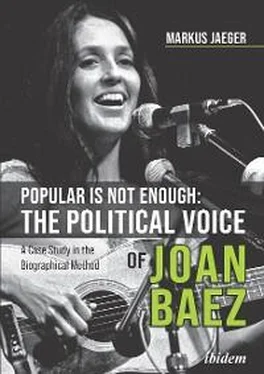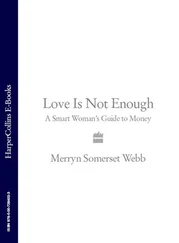The process of using cultural resources (while being politically active) has to be examined carefully on the edge of potential ideological abuse. Artistic influence on social movements undeniably has to face the possibility of instrumental use: this danger, nonetheless, is no reason to stop any further debate about the combination of popular music and political activism, because “[…] to the extent that social movements are able to transcend these instrumental (and commercial) usages, music as exemplary action becomes possible.” (Eyerman and Jamison 24). Organized political activity and artistic expression (in our case: the work of a popular singer) can be intertwined, transcending possible ideological or party-political abuse.
Reproaching this coalescence within social movements with commercial interests and lack of political credibility does not dismiss all of its potential. Eyerman and Jamison seriously doubt whether, for example, music theorist Theodor W. Adorno is right with his assumption that people (who are those people?) merely listened to the radio and not to the music on the radio (see also Eyerman and Jamison 137). The aim of this study is to verify the truth behind this doubt (chapter 1.4 has a particularly close look at Adorno’s approach to popular culture and the authenticity of politically active artists). On the one hand, songs can be able to enhance the political struggle of social movements, which, on the other hand, “[…] provide a cohesiveness, a kind of social glue, that reconfigures the relations between culture and politics […]” (Eyerman and Jamison 78). Throughout her whole career, Baez has offered her own work to the work of social movements and has thereby non-violently added relevant “[…] social glue […]” (Ibid.) to their passionate political efforts. The main methodological approach to analyze this contribution is the biographical method.
1.3 Life Is the Method: On the Sisterhood of Biography and Society
The primary driving force to discuss one single artist regarding the main thesis of this study is to understand “[…] that the subject’s life story reflects a set of meaningful experiences which, when told, create an emotional bond between the teller and the listener […]” (Denzin 198). In our case, what reflects these experiences is not only told but also sung and/or expressed in political activities as well. The emotional bond is created between Baez as a singer and her listeners and/or between Baez as a political activist and those, who politically agree with her positions. The most fruitful methodological approach to analyze these reflections and their consequential emotional bonds is the biographical method (or life history).
The argumentative essence of the biographical method is the view that a closer analysis of a single person’s life can offer a depiction of “[…] the intersection between the lives of people and the history of their society […]” (Bogdan and Taylor 7). In his liner notes to Baez’s 2005 live-Album Bowery Songs 1, which can be interpreted as a musical reply to the Presidential election of 2004 (see also Levy liner notes 2006), Levy summarizes this aspect in regard to Baez by attaching significance to “[…] crucial moments during her long and storied career - which is to say […] crucial moments in America's history over the past four decades and then some […]” (Ibid.). This linkage between Baez’s professional activities and the background of the cultural and political development in the United States is analyzed in this present study. In order to successfully apply the biographical method to this kind of research, analytical means “[…] range from letters to autobiographies, from newspaper accounts to court records […]” (Denzin 183). This definition eloquently summarizes the methodological devices used in my study. Denzin offers another possibility of defining the biographical method:
The life history, life story, biographical method presents the experiences and definitions held by one person, one group, or one organization as this person, group, or organization interprets those experiences. Life history materials include any record or document […] that throws light on the subjective behavior of individuals or groups […] (Ibid.).
An important advantage of the life history to be of interpretive help in this regard is that it “[…] closely approximates the fit between theory, method, and interpretation […]” (Ibid.). It can give insights to the complexity of social realities, for which theories no longer are enough (see also Fuchs-Heinritz 7). In addition to that, the biographical method demands an interdisciplinary approach (see also Völter, Dansien, Lutz and Rosenthal 8); a cognition which goes hand in hand with what I point out in chapter 1.1 and with the research of Bohnsack and Marotzki, who are convinced that an interdisciplinary character displays one of the primary conditions for qualitative methods (see also Bohnsack and Marotzki 7). Although these different faces of the life history also create the risk of subjectivity, as the selection of events—when discussing the life of an individual—does not follow certain empirical rules, it does not necessarily mean that a scientific debate is a priori impossible. As DuBois explains by introducing the term ‘lifelines’ and pointing out possible empirical support in an analysis, which is based on the biographical method:
[…] Any one person has, theoretically, a multitude if not infinitude of lifelines. […] The various lifelines are drawn at various times and in various circumstances by persons and organisations with very varied and sometimes opposing interests […]. The lines however are not arbitrary. There are safeguards for veracity. There are statements which can be proven false (e.g. so and so was not at such and such a place at such and such a time) […] (DuBois 21).
The reference to such ‘lifelines’ already hints at what Baez claims in the preface to her own autobiography, where she states that writing “And a voice to sing with” (New York: Summit Books, 1987) meant tracing the “[…] threads of my personal, political, spiritual, and musical lives—how they came together and how they fell apart, depending on the times and the circumstances […]” (Baez Voice 13). This statement sums up the background of this study: it is not intended to give a subjective overall description of Baez’s life or be some sort of unauthorized biography; its aim is rather to discuss several of her ‘lifelines’—in order to explain the motivation for analyzing the significance of her work as an activist and the question which role her artistic work has played for her political efforts. In order to do so, all materials and sources are relevant for the debate, as Denzin also concludes:
A central assumption of the life history is that human conduct is to be studied and understood from the perspective of the persons involved. All materials that reflect upon this perspective should be employed […] (Denzin 183).
The following sub-chapter discusses the question of how far the various manifestations of Baez’s political perspective are influenced by her work as a popular singer. Popular culture theory does not offer a clear-cut possibility to define the cultural and intellectual significance of popular culture. Pop-musicologist Fuhr correctly suggests accepting the fact that particularly popular music is not to be grasped with explanation models, which attribute a problem to a single cause (see also Fuhr, 131). Fuhr is another expert, who agrees on my assumption in chapter 1.1 on the advantages of interdisciplinarity. He is convinced that a scientific analysis of popular music can only be fruitful as an interdisciplinary project (see Ibid.). A scientific debate about popular culture—and popular music in particular—is more a scientific conflict. Anyone who attempts to work on popular music should be “[…] living out the tension […]” (Middleton in Ibid.) between the cultivated side of academic training and the popular side of his subject matter. Taking this suggestion into account, it is necessary and worth a try to find an answer to the question why a singer like Joan Baez can be defined as a popular singer and why it is her deep-felt conviction that being popular is not enough.
Читать дальше












